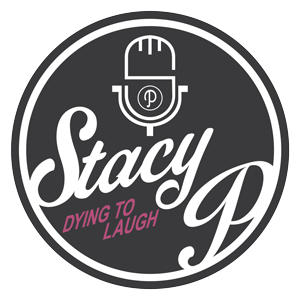
Stage fright sucks. I know because I have it. Despite having a degree in theatre, performing stand-up comedy and giving countless speeches in front of ultimately 1,000’s, that dreaded feeling of knots in my stomach before taking the stage, still occurs.
- Know What it is You’re Afraid of.
Being able to pin-point exactly what terrifies you, can help give you a game plan to combat stage fright.
So…what is it specifically that scares the snot out of you about speaking in front of an audience???
-Forgetting your lines?
-Falling off the stage?
-The simple act of people staring at you?
-Feeling vulnerable?
Here’s food for thought. I’m guessing that most of what people are afraid of-myself included- boils down to a fear of being rejected.
If you forget your lines, fall off the stage, pee your pants, basically-are human and imperfect in anyway-people might reject you. Being vulnerable in front of an audience means-being vulnerable to rejection.
If you’ve ever dropped your lunch tray in middle school, been dumped by someone you thought you’d die without, or been fired, your keen on the fact rejection is a wee bit devastating.
The way to handle-maybe not overcome-but handle the fear of rejection is to have a game plan to do your best, and a healthy mind set of knowing why you are up on the stage in the first place. (AKA-read the other tips.)

- Over Prepare
During my time in the theatre, it was drilled in me the adequate number of hours for rehearsal was 1 hour per 1 minute on stage. Yep. That’s a lot. Here’s why that rule of thumb can be super beneficial to you:
-A lot of people think memorizing your speech, or at least memorizing the outline of your speech, means you are now prepared. Memorizing is only the very first part of preparing. The first 10%ish.
The remaining 90%ish is knowing where and when to move on the stage should you venture from the safety blanket of a podium. Knowing where to look, how to inject a story or joke without feeling dumb, and maybe getting super wild and crazy by having the audience interact with you. This all comes from rehearsing if you are the skittish type like me.
*Bonus Tip: Here’s how to know if you are memorized enough. You can “speed through” your speech without having to think of the lines or what’s next. If you have to stop and think-you’re not memorized enough. You should be able to vomit your speech, or speech outline and slides out, with zero thought. (Not literally-although if you have stage fright….we know vomit is a distinct possibility.)
If you are prone to forgetting everything when you get on stage-this REALLY can help. As long as you can get your first line out, the remaining speech can be a reflex if you’re memorized enough. It’ll spill out without you blanking out.

- Disaster Response
In the spirit of preparation. Prepare for the worst. Go back to tip # 1 and think through all the things you’re afraid of.
If you’re afraid of falling off the stage, come up with a line or two to give, should you fall off.
If you forget a line, come up with a line or two, should you forget.
If you can’t get your first words out, come up with a line or two…do you see where this is going?
Come up with a backup plan on the things that can go wrong you find yourself obsessing about.
Here’s things that have gone wrong so you can have more to obsess about:
-Fire Alarm
-People Getting Sick
-Lights or set pieces falling
-Whoever is supposed to come on or off stage with you, before you, after you-doesn’t
-Someone gets sick in the audience
These are all things that have happened to me and a whole lot more.
2 biggest things to know:
-DON’T freak out. Remain calm.
-Ask about emergency plans such as exits, who to point to, etc., when you arrive early (notice I said “early”). Then you’ll know what to do should something happen when you’re on stage.
*Bonus Tip: One of the number one things that can go wrong is actually sound/tech. Be prepared for the sound/tech to not work right. Always have a backup plan should your slides not work, your microphone go out, a light falls. (Yes, that can happen.) Yelling at the sound tech guys in the back of the room or swearing at them under your breath in the microphone is NOTan option. Those guys work hard and sound and tech is complicated. That’s why things can go south with a flip of a switch.
*Bonus tip, for the bonus tip I just gave: Make friends with the sound guys before you go on. They’re usually great people anyway, but knowing they’ll do anything for you because you treated them kindly and with respect can bode well for you.
 4. Breathe Through Body Betrayal
4. Breathe Through Body Betrayal
When you give a speech do you tremble like a 8.0 earthquake on the Richter scale? Does your voice go in and out and squeak like a pubescent boy? Are you out of breath and sweating so profusely three minutes into your speech you look like you’re in the middle of a marathon?
Breath. Stand properly and Take. The. Time. To. Breathe.
There’s something called a “proper acting stance”. It’s standing with your feet shoulder width apart, your knees slightly bent, spine straight, and the rest of you relaxed.
They key portion to the “proper acting stance” is having your knees slightly bent. I was taught this helps with blood flow, as well as allows you to breathe easier. If you’ve ever watched a funny video of someone in a choir or a wedding keeling over, it could be from them locking their knees and not breathing.
If you find your body doing things you don’t want it to do:
-Calmly stop
-Make sure your knees are loose
-Relax your body
-Take a breath before the next sentence. Do this as often as you need to in the beginning to calm yourself down.
Does it seem weird and awkward to have you breathe between sentences? No. To the audience, it can appear like you are taking deliberate pauses to allow them to think. It can actually make you look brilliant. If it does appear slightly awkward, it’s not as awkward as you passing out in front of them and being drug off the stage. So-take the time to breathe.
*Bonus Tip: Superman poses and other oddities.I must confess I have tried these. (You can google some of this stuff for stage fright.) It’s never helped me, but that’s not to say weird body poses and such, won’t work for you.

- Do What’s Right for You
I’m a massive introvert. My husband is not. He used to make fun of people like me who need to take time before getting on stage to “focus”. Then he met me. He had to shut up about “serious artistic dramatic types” because-he liked me. *Bonus Tip: If you have a crush on someone, making fun of them won’t get you very far.
My husband can LITERALLY be in the middle of a sentence with someone back stage, then walk on stage-give a profound musical performance-and walk right back off and finish the conversation.
I need to stop talking days in advance to prepare. Ok-maybe not DAYS, but if feels like it. For the longest time I tried to be polite and “network” and mingle with the audience before. It was so awkward because I wasn’t present in the conversations with people. I was rehearsing my speech in my head. Then I’d try and go on stage and I wasn’t ready. I felt disjointed.
I’ve finally had to embrace the fact, I’m just one of those weird moody performers who has to be alone to get ready. (I’m a high energy, funny speaker/comedian, so I know it’s weird that I’m also a shy moody performer.) I do a better job on stage when I have alone time before I go on. Then, when I DO talk to people afterwards, I’m present to listen and participate in meaningful conversation.
You need to do what’s right for you before you go on. If you get energized and amped when around people-do that. Be around people. If you’re super scared, go hide. It’s ok. (Just as long as you come back out to give the speech…) Listen to your favorite tune, run through your slides, do what you need to do to be in a good head space before you go on.
I tend to freak meeting planners out when they meet me in real life. I’m nothing at all in real life who I am on stage (energetic and funny). I’m quiet in person. So, I’ve learned to warn them in advance. I also let them know I usually go “hide” a little bit before I go on. It takes the pressure off of me of having to “perform” off stage, as well as on. If you are like me, this can help.

- Do It Anyway
I co-founded the Academy of Children’s Theatre in Colorado Springs, CO. I taught the kids this line when it comes to stage fright:
“There are those who are afraid so they don’t.
There are those who are afraid and do it anyway.
So-do it anyway.”
Great advice for stage fright and for life, if I do say so myself. (Excuse me while I pat myself on the back.)
If there is ONE huge misconception I wish I could wipe off the planet, this would be about…12thon the list (cause there’s a lot of things like prejudice and world hunger I’d wipe off first).
Misconception: People think that because they have stage fright they shouldn’t speak or perform. THIS IS NOT TRUE. Most people DO have stage fright. I have it and I speak, and I’ve done ok for myself thus far. Lots of actors, speakers, comedians, musicians, fear getting in front of an audience. They’ve just learned to get up and do it anyway.
Here’s what happens when you do it anyway. You learn you won’t die up there. All those icky scardy-ish feelings dissipate the farther into the talk or performance you get. When it’s over you’ll feel pretty good about accomplishing what most people are too afraid to ever try. AND, when someone comes up to you after, you learn you’re making a difference in their life. That’s a pretty good feeling that can make everything worth it.

- Humor is Your Friend….Maybe
If you’ve convinced yourself you will feel like you’re dying up there on stage, humor can help calm everyone’s uneasiness.
Here’s the problem with you being uneasy on stage. It makes the audience uneasy. They’re nervous that you’re nervous.
My advice, a well-placed funny line about you being nervous will point out the elephant in the room. Everyone will laugh and be less on edge. Laughter releases all those juicy great positive endorphins, lowers stress, and opens up learning centers of the brain. Humor’s a feel good, win -win.
UNLESS, you make an off-color joke. THEN, you probably should be nervous.
Avoid:
-Sex
-Polities
-Religion
-Cussing
-Gender Bashing
-Other Speakers or Company/Organizational Leaders in the Room (Unless you have their prior permission.)
-Sports (unless that’s what your audience relates to. That’s a WHOLE other post for another day.)
Really, you should just make fun of yourself. If you’re not naturally funny, ask a funny friend for help. Make sure their humor is clean, though.
One line is all you need, but you can go as far as telling an elaborate story with a punch line at the end about how terrified you are right now. (Example: the time you had to jump out of a burning airplane, while you had a 104 degree temperature and 2 broken legs not knowing how you were supposed to land was ALMOST as scary as standing up here speaking in front of you. You survived the plane crash, but surviving the speech is yet to be seen.)
Now, don’t use that exactly. That’s a terrible example, but you get the point…I hope.
All right. There you go. That’s my 7 tips. Now go prepare, breathe and be brilliant.
Kindly, Stacy P.
PS. If you find this post helpful, share it. If not, don’t tell me. I’m not a fan of rejection…
To learn more about Stacy P. click the video below or visit her website at: StacyPederson.com



